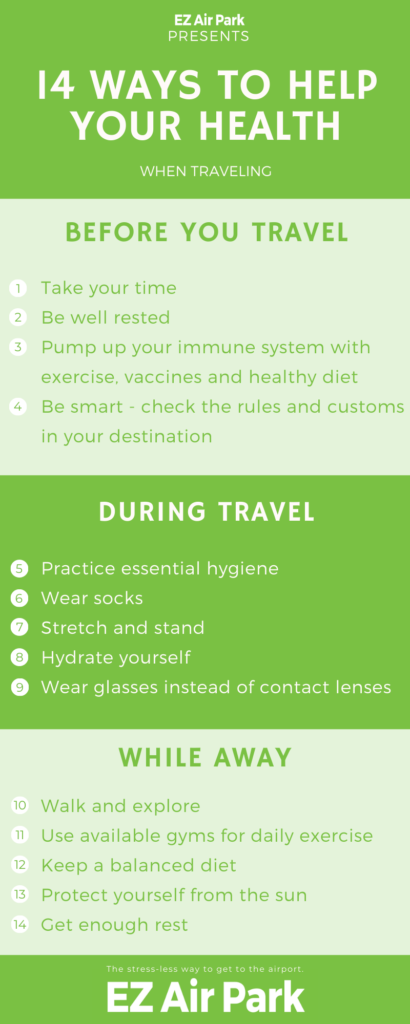Easy and practical tips that keep you feeling healthy before you travel, when in transit, and once you reach your destination.
Travel puts extra pressure on your body. Disruption to sleep patterns and eating habits, combined with less exercise and being in a confined space with hundreds of other people, raise your chances of getting sick. In short, travel asks a lot of your immune system.
If the thought of being away from home and feeling unwell fills you with dread, then stick with us. We’ve pulled together tips and findings from trusted medical and health sources — along with a few ideas from our own experience of being frequent travelers — to bring you sensible and practical ideas that may increase your chances of staying healthy.
Here’s what you can do to help your body out before you travel, when in transit, and once you reach your destination.
Before you travel
Take your time
Stress is known to weaken the immune system, and there’s certainly plenty to get worked up about before you travel. Combat feelings of stress and unease by giving yourself plenty of time to prepare for your trip. Are there any activities and commitments you can scale back on? Can you plan what you need to pack days in advance rather than leave it to the day of? Have you checked with your neighbor that they can take care of your home or grab the mail while away?
Getting all of these details organized can help limit last minute stress or trying to cram too much into a short amount of time.
Be well rested
It’s also a good idea to catch a few extra minutes or hours of sleep. The American Academy of Sleep Medicine (AASM) suggests adults get at least seven hours of sleep. If you’re crossing time zones so jet lag becomes an issue the AASM suggests slowly changing your sleep patterns before you fly. Steadily alter your body clock so the times you sleep and wake are closer to the times at your destination.

Give yourself a body boost
Heading to foreign lands (yes, even if you’re only going one state over) means exposing your immune system to different germs and viruses. There are three key things you can do to make sure your immune system has the best chance of dealing with illness.
- Protect yourself by making sure your vaccines are up to date
- Exercise regularly before you travel. Not only does exercise help lower stress, but it also mobilizes white blood cells, which remember and deal with germs
- Improve your gut health and positively affect your immune system by eating foods that are rich in fiber — fruit, vegetables, and whole grains — advises The Physicians Committee for Responsible Medicine.
Be a smart traveler
Check for health advice and warnings on everything from outbreaks to food and water hygiene by using the traveler section on the Centers for Disease Control and Prevention (CDC) website. Select the country you’re traveling to and it returns important information about staying healthy and happy in that location.
Use the information you find here to decide if you need to book an appointment to see your doctor for extra shots. Of course, if you’re traveling with known medical conditions or you are pregnant, it’s always a good idea to check in with your health professional for any extra tips and advice on looking after yourself when away.
During travel
Essential hygiene
Washing your hands and covering your mouth and nose when you cough or sneeze is always important. But with more viruses popping up every day, practicing essential hygiene is more important than ever.
Pack a bottle of hand sanitizer that’s up to three ounces (so it clears security) and keep a pack of antibacterial wipes handy. If you need to cough or sneeze, do it into a tissue and put it in the trash.
Wash your hands with warm water and soap or use hand sanitizer if you can’t get to a sink.
We’re following the hand washing advice from WHO.
On the plane, use the wipes to give armrests, video screens, and tray tables an extra wipe down before settling in.
Wear socks
Security may ask for shoes to be removed. Protect your feet from catching, or spreading, foot fungus or skin irritations by wearing socks.
Stretch and stand
Travel involves a lot of sitting around, be it in your car on your way to the offsite car park, on the plane, or when you’re waiting in the terminal. Sitting for long periods can damage your health. According to one large-scale study of 150,000 Australians, adults who didn’t exercise and spent eight hours or more sitting, increased their risk of death by 52%, compared to those adults who sat for four hours or less.
The message is to take advantage of times when you can stand and move around when in the terminal. When on the plane, make a conscious effort to get out of your seat and walk around the cabin or do simple legs and foot stretches while in your seat.
Hydrate yourself
The air around us and the amount of water we drink keeps us hydrated. Unfortunately, humidity drops off dramatically during air travel. The mean humidity levels in an aircraft are 14-19 percent. For context, humidity levels we’re used to range from 40 percent to 90 percent, depending on whether we’re indoors or outside.
Around 60 percent of the adult body is made of water.
Being stuck in an environment that’s drier than a desert means it’s important to keep hydrated. Take a reusable water bottle with you and top up at a drinking fountain after clearing security. During the flight, if you choose to enjoy a beer or wine with your inflight meal help your body out by asking for a glass of water to balance it out.
Swap to specs
Wearing contact lenses in dry air is often uncomfortable. And when your eyes get irritated there’s more temptation to rub them, which means touching your face and increasing the risk of germs getting into your body. While in transit, wear your glasses instead.
While away
Walk and explore
Walking is a great way to get around. It gives you a chance to understand the lay of the land and discover things you may not see from a car or bus. Importantly, walking briskly is a free way to keep up your fitness.
Use the fitness facilities
Staying in accommodation with gym or fitness facilities? Then take advantage of them. Current health guidelines for Americans recommend packing in 2.5 hours to 5 hours of moderate-intensity aerobic activity each week. If you know you’re likely to be traveling in cars or stuck in an office all day, then smash these goals out in the gym or pool to keep yourself feeling good.
Keep a balanced diet
One of the best things about travel is the chance to try new cuisine and have someone else cook for you. But while you’re treating yourself, remember to make sure those treats include a variety of foods. Remember the earlier mention of taking care of your gut bacteria? That doesn’t change once you’ve reached your destination. Avoid feelings of sluggishness or an unsettled stomach by keeping a balanced diet rather than loading up on treats for breakfast, lunch, and dinner.

Stay cool and protect yourself from the sun
Doing too much in hot temperatures or spending too long in the sun can overwhelm your body and lead to heatstroke. Headaches, nausea, and dizziness are often signs you’re overheating, and a serious case of heatstroke can land you in hospital. To minimize the risk of heatstroke, the CDC suggests:
- • Spending time in an air-conditioned environment, which will help lower your body temperature
- • Wearing light-colored, loose-fitting clothes
- • Drink plenty of water and avoid alcohol
- •Save strenuous activities for cooler parts of the day.
Keeping cool goes hand-in-hand with protecting your skin from the sun. And a holiday isn’t a holiday without the coconutty smell of sunscreen. When it comes to avoiding harmful UVA and UVB rays from the sun, the Environmental Protection Agency recommends staying out of the sun during the hottest part of the day and ‘generously apply about one ounce of sunscreen to cover all exposed skin 15 minutes before going outside.’ Use lotions that are SPF 15 or higher and make sure you reapply every two hours.
Get enough rest
Travel is fun because you get to explore new places, so the temptation is to pack in as much as possible. But burning the candle at both ends can lead to burn out. Be realistic about what you can fit into each day. And if you know you’ve got an early start for excursions or meetings, get to bed at a reasonable time. Or vice versa: if there’s an evening event you want to catch, let yourself have a lazy morning.
A little common sense keeps you healthy during travel
Everything in life comes with some risk, but the thought of getting sick while you travel shouldn’t hold you back from seeing the world. With a little extra planning and mindfulness before you travel, when in transit and while you’re away, you’ll minimize your chances of getting ill giving you the chance to enjoy every part of your trip.
To get this and similar articles delivered straight to your inbox, sign up for our emails.


